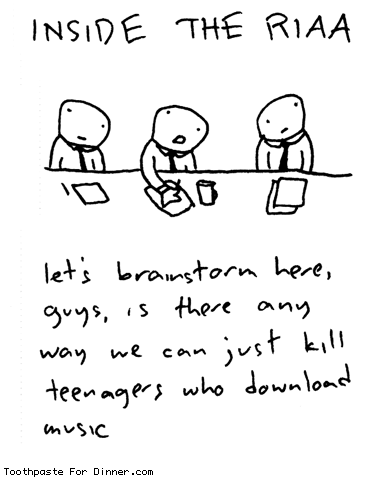Judge deals blow to RIAA's boilerplate copyright infringement complaints

By Eric Bangeman | Published: September 10, 2007 - 08:26AM CT
In the over 20,000 file-sharing cases filed so far, the RIAA has relied on a simple procedure: scour P2P networks for shared music, file a John Doe lawsuit to learn the identity of the account-holder responsible for the IP address flagged by the RIAA's investigative arm, and, if the account-holder doesn't agree to the RIAA's settlement terms, file a lawsuit using a boilerplate complaint. A federal judge in California has now refused to grant the RIAA a judgment based on just such a complaint, forcing the RIAA to draw up a new complaint containing specifics.
Yolanda Rodriguez was sued by the record labels for copyright infringement in November of last year. Apparently, Rodriguez is of the "ignore the problem and hope it will go away" mindset, as she never filed an answer to the complaint, and a search of the case history shows no action on her part to fight the lawsuit.
Given Rodriguez's inaction, the clerk entered a notice of default this past April. In July, the record labels asked the court for a default judgment in the amount of $3,750 (five songs at $750 each) plus $420 in court costs. Judge Rudi M. Brewster declined to give the RIAA what it was asking for, ruling that the plaintiffs' boilerplate complaint "fails to sufficiently state a claim upon which relief may be granted."
Drawing on the recent Bell Atlantic v. Twombly case decided by the Supreme Court, Judge Brewster held that the RIAA's complaint wasn't sufficient to merit a default judgment. "[O]ther than the bare conclusory statement that on 'information and belief, Defendant has downloaded, distributed and/or made available for distribution to the public copyrighted works, Plaintiffs have presented no facts that would indicate that this allegation is anything more than speculation," wrote the judge. "The complaint is simply a boilerplate listing of the elements of copyright infringement without any facts pertaining specifically to the instant Defendant."
Bell Atlantic v. Twombly involved allegations that the Baby Bells engaged in an anticompetitive conspiracy to hinder local phone and broadband competition. The Supreme Court ruled that the mere fact that a conspiracy was conceivable and that the companies engaged in conduct that supported the conspiracy allegations wasn't enough for a lawsuit to proceed.
Judge Brewster vacated the entry of default but gave the RIAA 30 days to refile the complaint and serve Rodriguez with it. It took the RIAA little less than a week to file an amended complaint. In contrast to the original complaint, which was extremely short on specifics, the RIAA's latest filing offers more in the way of details. Those details include the date the RIAA spotted the PC it believes was used by Rodriguez on Gnutella, the IP address, and a list of recordings in the user's shared folder.
There's still a great deal of "information and belief," however. The RIAA is "informed and believe[s]" that Rodriguez "had continuously used and continued to use a P2P network to download and/or distribute to the public" the files contained in the shared folder as well as "additional sound recordings owned by or exclusively licensed to" the labels.
In fact, the only significant difference between the original and amended complaint are the dates, IP address, the name of the network, and screenshots showing each and every file seen in the shared folder allegedly residing on Rodriguez's PC. Of course, if Rodriguez once again fails to show up in court, that may be enough to grant a default judgment.
Judge Brewster's decision may have ramifications for two contested lawsuits, Elektra v. Barker and Warner v. Cassin. The judges in both cases have indicated their intention to rule on a central facet of the RIAA's complaints, that making a song available over a P2P network constitutes copyright infringement. Copyright attorney Ray Beckerman, who is defending both Barker and Cassin, points out that the judge's ruling in Interscope v. Rodriguez supports the arguments made in the other two cases.